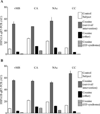Increased heat shock protein 70 gene expression in the brains of cocaine-related fatalities may be reflective of postdrug survival and intervention rather than excited delirium
- PMID: 22803793
- PMCID: PMC4530606
- DOI: 10.1111/j.1556-4029.2012.02212.x
Increased heat shock protein 70 gene expression in the brains of cocaine-related fatalities may be reflective of postdrug survival and intervention rather than excited delirium
Abstract
Cocaine-related fatalities can pose forensic challenges, particularly when accompanied by excited delirium (ED) syndrome and interventions by law enforcement and medical personnel. A recent report concluded that elevated heat shock protein 70 (HSP70) expression in autopsy brain samples constitutes a reliable forensic biomarker for the identification of ED as a cause of death. The present study quantified the abundance of both HSPA1A and HSPA1B gene (HSP70-encoding) transcripts in midbrain specimens from a series of cocaine-related fatalities and matched drug-free control subjects. HSP70 expression was increased significantly in cocaine abusers as a group compared to control subjects, irrespective of the presence or absence of ED. Furthermore, elevated HSP70 expression was predictive of a period of survival between cocaine use and death that included medical and/or police intervention. The present data do not support the assertion that HSP70 expression is a reliable brain biomarker for identifying ED as a cause of death.
© 2012 American Academy of Forensic Sciences.
Figures


Comment in
-
Commentary on: Johnson MM, David JA, Michelhaugh SK, Schmidt CJ, Bannon MJ. Increased heat shock protein 70 gene expression in the brains of cocaine-related fatalities may be reflective of postdrug survival and intervention rather than excited delirium. J Forensic Sci 2012;57(6):1519-23.J Forensic Sci. 2013 Mar;58(2):559-61. doi: 10.1111/1556-4029.12081. J Forensic Sci. 2013. PMID: 24811527 No abstract available.
-
Authors' response.J Forensic Sci. 2013 Mar;58(2):562. doi: 10.1111/1556-4029.12080. J Forensic Sci. 2013. PMID: 24811528 No abstract available.
References
-
- Grant JR, Southall PE, Fowler DR, Mealey J, Thomas EJ, Kinlock TW. Death in custody: a historical analysis. J Forensic Sci. 2007 Sep;52(5):1177–1181. - PubMed
-
- Vilke GM, Payne-James J, Karch SB. Excited Delirium Syndrome (ExDS): redefining an old diagnosis. J Forensic Legal Med. 2012 Jan;19(1):7–11. - PubMed
-
- Mash DC, Duque L, Pablo J, Qin Y, Adi N, Hearn WL, et al. Brain biomarkers for identifying excited delirium as a cause of sudden death. Forensic Sci Int. 2009 Sep 10;190(1–3):e13–e19. - PubMed

